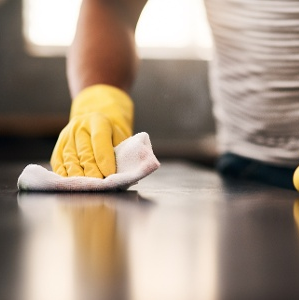How to Effectively Clean and Disinfect Countertops during the COVID-19 Pandemic and Beyond

First, we do not recommend cleaning your countertops with bleach or abrasive cleansers. The gritty texture of abrasive cleaners are made of small particles, minerals, or fine steel wool, copper, or metal particles, and these particles can damage the stone surface. Even a natural option like vinegar can cause harm as frequent uses of acidic substances can dull appearances and weaken the sealant.
So, what can you do to create a safer home environment without risking the beauty and shine of your natural countertops? Here is how to safely clean and disinfect the natural and engineered stone surfaces in your home.
Seal Stone Regularly
One of the best ways to prevent the proliferation of germs on countertop surfaces is with a sealer that stops bacteria and viruses from seeping into the porous surface in the first place. Although stone, like marble and granite, is naturally resistant to bacteria, a high-quality countertop sealer prevents the intrusion of pathogens that may linger, not to mention eyesores like staining.
Engineered stone surfaces, such as porcelain or quartz, will not require sealing, as they are already non-porous. However, natural stone countertops should be sealed regularly. If you haven’t sealed your countertops in over 3-5 years, we recommend scheduling a professional sealing and maintaining a sealing schedule moving forward.
Step #1: Cleaning Countertops with Mild Soap
Here are some general cleaning best practices to remember while cleaning and disinfecting your countertops from the CDC:
- Wear reusable or disposable gloves while cleaning
- Do not mix cleaning products with one another as this may create hazardous substances to breathe in or touch
- Always follow the labeled instructions on your cleaning products
- Avoid chemical contact with any food or drink items in your kitchen
- The CDC recommends first cleaning your countertops surfaces with mild soap and water and then disinfecting with the right cleanser for your countertop.
A soapy lather disrupts and kills the coronavirus, which is why it’s an ideal choice not only for washing your hands but cleaning and sanitizing surfaces, as well. Soap molecules are drawn to the outer layer of the virus, in the same way, they’re drawn to oil on your skin. When soap bonds with bacteria or viruses, it splits them open, rendering them inactive and incapable of binding to human cells.
Here are the steps for using mild soap on your countertops:
1. Fill your sink with hot water and a gentle, antibacterial cleanser, like dish soap, to create a rich lather.
2. Make sure to create a lot of foam and then wash your countertop in sections for 20 seconds at a time. The more bubbles, the greater your cleaning power. You could also leave warm, soapy water sitting on the surface for a few minutes before wiping it away.
3. After you rinse the surface thoroughly with warm water to remove the lather, go over it with your regular stone cleaner to eliminate any streaks or film left behind by the soap.
Step #2: Disinfecting Countertops with Alcohol-Based Cleansers
While the cleaning process removes dirt and germs, disinfecting is what kills the germs, which is why both steps are needed. As you know, bleach, ammonia, and abrasive cleansers are not recommended, however, you can safely use rubbing alcohol, which is adept at killing all kinds of germs, including coronavirus (as evidenced by alcohol-based hand sanitizers).
The CDC recommends using products with at least a 70% alcohol concentration, as anything below 50% simply won’t effectively kill germs. Why not use 100% alcohol? It evaporates too quickly to effectively kill germs. The good news is, you probably won’t have to bother diluting your alcohol. The isopropyl alcohol you buy in the store typically contains a 70% concentration of alcohol, already mixed with water, which makes it ideal for cleaning purposes.
Here are the steps for using alcohol-based products on your countertops:
1. Add the product into a spray bottle and add water to dilute it (if necessary). You can also double up on efficacy by pairing alcohol and soap into one cleanser. For cleaning natural stone or engineered stone surfaces, mix four tablespoons of isopropyl alcohol with a few drops of antibacterial dish soap in a 1-liter spray bottle and add hot water to fill.
2. Shake gently and spray over the surface of your countertops and allow it to sit for five minutes
3. Rinse the surface with water and wipe it dry with a soft, microfiber cloth.
Keep your family safe while maintaining your countertop investment is a priority. The good news is, you can fight the coronavirus and other germs in your home without harming your stone countertops when you use the right cleaning and disinfecting processes. Everyday cleaning is an important part of protecting your investment and ensuring a safe, clean home. Click here to learn more about the care and maintenance for marble, granite and quartzite countertops.
How Academy Marble is Responding to COVID-19
The health and safety of our customers, employees and community is of utmost importance to use. We are taking every precautionary necessary to ensure your safety and are now offering virtual consultations. To learn more and schedule a virtual consultation with one of our design experts, please click here.


